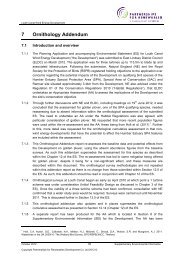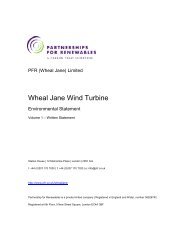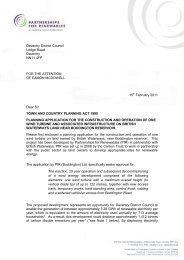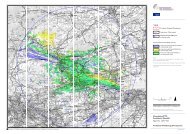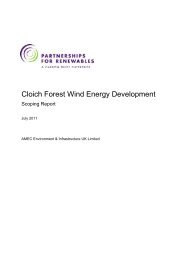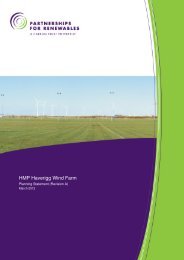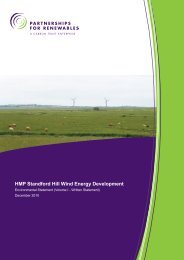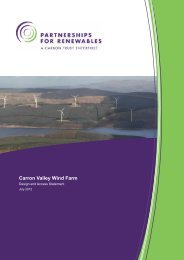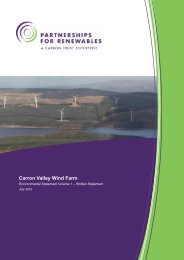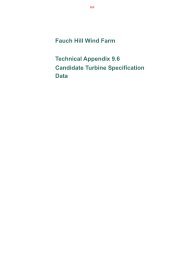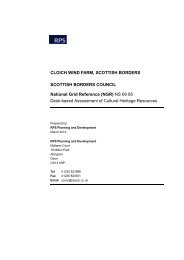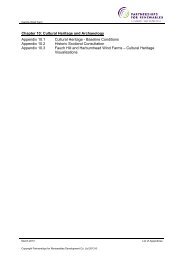Planning Supporting Statement - Partnerships for Renewables
Planning Supporting Statement - Partnerships for Renewables
Planning Supporting Statement - Partnerships for Renewables
You also want an ePaper? Increase the reach of your titles
YUMPU automatically turns print PDFs into web optimized ePapers that Google loves.
Louth Canal Wind Energy Development<br />
4.2.3 Stern‟s key messages in relation to the need <strong>for</strong> stabilisation of greenhouse gas emissions<br />
highlights the need to ensure that decisions to tackle the issue are taken now to stem the<br />
increase in global warming:<br />
“The world is already irrevocably committed to further climate changes, which will lead to<br />
adverse impacts in many areas. Global temperatures, and there<strong>for</strong>e the severity of impacts,<br />
will continue to rise unless the stock of greenhouse gases is stabilised. Urgent action is now<br />
required to prevent temperatures rising to even higher levels, lowering the risks of impacts that<br />
could otherwise seriously threaten lives and livelihoods worldwide.” 4<br />
4.3 The UK Climate Change Programme and Energy White Paper<br />
4.3.1 As a central element in meeting its Kyoto Agreements, where the UK committed to reduce<br />
emissions of greenhouse gases, principally Carbon Dioxide, by around 5.2% below their 1990<br />
levels over the next decade the Government published its Climate Change Programme in 2000<br />
(reviewed in March 2006 5 ). This sought to further reduce the UK‟s emissions of greenhouse<br />
gases to 20% below 1990 levels by 2010, exceeding the previous Kyoto target. In the longer<br />
term the programme recognised that much larger global cuts of over 60% would be required,<br />
rein<strong>for</strong>cing the benefits from taking early proactive action to reduce emissions.<br />
4.3.2 The Government published the Energy White Paper in 2007. This set out the importance of<br />
energy to society and the economy and the need to consider energy in relation to tackling<br />
climate change and the importance of a secure, clean and af<strong>for</strong>dable energy supply. This set<br />
out four policy goals in regards to energy which rein<strong>for</strong>ced the need to cut CO 2 emissions by<br />
some 60% by about 2050, with 20% of electricity from renewable sources by 2020. The 2006<br />
Energy Review, which preceded the White Paper, included a specific statement on<br />
renewables 6 : The White Paper states that:<br />
“Recognising the particular difficulties faced by renewables in securing planning consent, the<br />
Government is also: Underlining that applicants will no longer have to demonstrate either the<br />
overall need <strong>for</strong> renewable energy or <strong>for</strong> their particular proposal to be sited in a particular<br />
location” (paragraph 5.3.67, page 156).”<br />
4.4 Energy, Climate Change and <strong>Planning</strong> and Energy Acts (2008)<br />
4.4.1 The Energy Act 2008 implements the legislative aspects of the 2007 Energy White Paper. With<br />
regard to onshore wind, the Energy Act strengthens the renewables obligation to drive a<br />
greater and more rapid deployment of renewables in the UK, increasing the diversity of the<br />
UK‟s electricity mix. The renewables obligation is the current main mechanism <strong>for</strong> supporting<br />
large scale generation of renewable electricity.<br />
4.4.2 The renewables obligation works by placing an obligation on licensed electricity suppliers to<br />
source a specified and annually increasing proportion of their electricity sales from renewable<br />
sources, or pay a penalty. Suppliers meet their obligations by presenting sufficient <strong>Renewables</strong><br />
Obligation Certificates (ROCs). A ROC is issued <strong>for</strong> each megawatt hour (MWh) generated by<br />
onshore wind.<br />
4 Stern Review, Chapter 8, Page 193<br />
5 HM Government (2006) Climate Change the UK Programme<br />
6 Department of Trade and Industry (2006) „Annex D: <strong>Renewables</strong> <strong>Statement</strong> of Need‟, The Energy Challenge<br />
March 2012 8 <strong>Planning</strong> <strong>Supporting</strong> <strong>Statement</strong><br />
Copyright <strong>Partnerships</strong> <strong>for</strong> <strong>Renewables</strong> Development Co. Ltd 2012 ©



